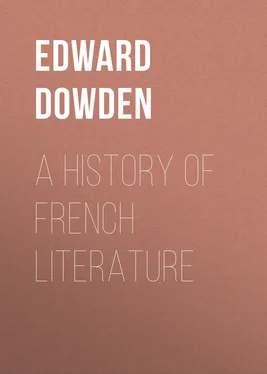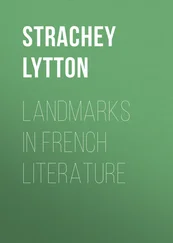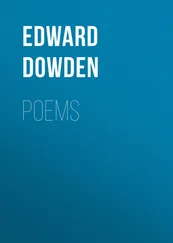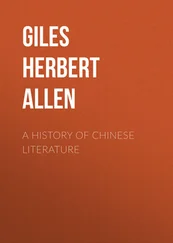Edward Dowden - A History of French Literature
Здесь есть возможность читать онлайн «Edward Dowden - A History of French Literature» — ознакомительный отрывок электронной книги совершенно бесплатно, а после прочтения отрывка купить полную версию. В некоторых случаях можно слушать аудио, скачать через торрент в формате fb2 и присутствует краткое содержание. Жанр: foreign_prose, foreign_home, Критика, Языкознание, foreign_antique, на английском языке. Описание произведения, (предисловие) а так же отзывы посетителей доступны на портале библиотеки ЛибКат.
- Название:A History of French Literature
- Автор:
- Жанр:
- Год:неизвестен
- ISBN:нет данных
- Рейтинг книги:3 / 5. Голосов: 1
-
Избранное:Добавить в избранное
- Отзывы:
-
Ваша оценка:
- 60
- 1
- 2
- 3
- 4
- 5
A History of French Literature: краткое содержание, описание и аннотация
Предлагаем к чтению аннотацию, описание, краткое содержание или предисловие (зависит от того, что написал сам автор книги «A History of French Literature»). Если вы не нашли необходимую информацию о книге — напишите в комментариях, мы постараемся отыскать её.
A History of French Literature — читать онлайн ознакомительный отрывок
Ниже представлен текст книги, разбитый по страницам. Система сохранения места последней прочитанной страницы, позволяет с удобством читать онлайн бесплатно книгу «A History of French Literature», без необходимости каждый раз заново искать на чём Вы остановились. Поставьте закладку, и сможете в любой момент перейти на страницу, на которой закончили чтение.
Интервал:
Закладка:
III
THE EPIC OF ANTIQUITY
Later to develop than the national epopee was that which formed the cycle of antiquity. Their romantic matter made the works of the Greco-Roman decadence even more attractive than the writings of the great classical authors to poets who would enter into rivalry with the singers of the chansons de geste . These poems, which mediævalise ancient literature—poems often of portentous length—have been classified in three groups—epic romances, historical or pseudo-historical romances, and mythological tales, including the imitations of Ovid. The earliest in date of the first group (about 1150-1155) is the ROMANCE OF THEBES, the work of an unknown author, founded upon a compendium of the Thebaid of Statius, preceded by the story of OEdipus. It opened the way for the vast ROMANCE OF TROY, written some ten years later, by Benoit de Sainte-More. The chief sources of Benoit were versions, probably more or less augmented, of the famous records of the Trojan war, ascribed to the Phrygian Dares, an imaginary defender of the city, and the Cretan Dictys, one of the besiegers. Episodes were added, in which, on a slender suggestion, Benoit set his own inventive faculty to work, and among these by far the most interesting and admirable is the story of Troilus and Briseida, known better to us by her later name of Cressida. Through Boccaccio's Il Filostrato this tale reached our English Chaucer, and through Chaucer it gave rise to the strange, half-heroic, half-satirical play of Shakespeare.
Again, ten years later, an unknown poet was adapting Virgil to the taste of his contemporaries in his Eneas , where the courtship of the Trojan hero and Lavinia is related in the chivalric manner. All these poems are composed in the swift octosyllabic verse; the Troy extends to thirty thousand lines. While the names of the personages are classical, the spirit and life of the romances are wholly mediæval: Troilus, and Hector, and Æneas are conceived as if knights of the Middle Ages; their wars and loves are those of gallant chevaliers. The Romance of Julius Cæsar (in alexandrine verse), the work of a certain Jacot de Forest, writing in the second half of the thirteenth century, versifies, with some additions from the Commentaries of Cæsar, an earlier prose translation by Jehan de Thuin (about 1240) of Lucan's Pharsalia—the oldest translation in prose of any secular work of antiquity. Cæsar's passion for Cleopatra in the Romance is the love prescribed to good knights by the amorous code of the writer's day, and Cleopatra herself has borrowed something of the charm of Tristram's Iseult.
If Julius Cæsar may be styled historical, the ROMAN D'ALEXANDRE, a poem of twenty thousand lines (to the form of which this romance gave its name—"alexandrine" verse), the work of Lambert le Tort and Alexandre de Bernay, can only be described as legendary. All—or nearly all—that was written during the Middle Ages in French on the subject of Alexander may be traced back to Latin versions of a Greek compilation, perhaps of the first century, ascribed to Callisthenes, the companion of Alexander on his Asiatic expedition. 5 5 Not quite all, for certain borrowings were made from the correspondence of Alexander with Dindimus, King of the Brahmans, and from the Alexandri Magni iter ad Paradisum .
It is uncertain how much the Alexandre may owe to a Provençal poem on the same subject, written in the early years of the twelfth century, probably by Albéric de Briançon, of which only a short fragment, but that of high merit, has been preserved. From his birth, and his education by Aristotle and the enchanter Nectanebus, to the division, as death approaches, of his empire between his twelve peers, the story of Alexander is a series of marvellous adventures; the imaginary wonders of the East, monstrous wild beasts, water-women, flower-maidens, Amazons, rain of fire, magic mountains, magic fountains, trees of the sun and of the moon, are introduced with a liberal hand. The hero is specially distinguished by the virtue of liberality; a jongleur who charms him by lays sung to the flute, is rewarded with the lordship of Tarsus, a worthy example for the twelfth-century patrons of the poet. The romance had a resounding fame.
Of classical poets, Ovid ranked next to Virgil in the esteem of the Middle Ages. The mythology of paganism was sanctified by the assumption that it was an allegory of Christian mysteries, and thus the stories might first be enjoyed by the imagination, and then be expounded in their spiritual meaning. The Metamorphoses supplied Chrétien de Troyes with the subject of his Philomena ; other writers gracefully dealt with the tales of Piramus and of Narcissus . But the most important work founded upon Ovid was a versified translation of the Metamorphoses (before 1305) by a Franciscan monk, Chrétien Legouais de Sainte-Maure, with appended interpretations, scientific, historical, moral, or religious, of the mythological fables. Ovid's Art of Love , of which more than one rendering was made, aided in the formation or development of the mediæval theory of love and the amorous casuistry founded upon that theory.
IV
ROMANCES OF LOVE AND COURTESY
Under the general title of the Épopée courtoise —the Epopee of Courtesy—may be grouped those romances which are either works of pure imagination or of uncertain origin, or which lead us back to Byzantine or to Celtic sources. They include some of the most beautiful and original poems of the Middle Ages. Appearing first about the opening of the twelfth century, later in date than the early chansons de geste , and contemporary with the courtly lyric poetry of love, they exhibit the chivalric spirit in a refined and graceful aspect; their marvels are not gross wonders, but often surprises of beauty; they are bright in colour, and varied in the play of life; the passions which they interpret, and especially the passion of love, are felt with an exquisite delicacy and a knowledge of the workings of the heart. They move lightly in their rhymed or assonanced verse; even when they passed into the form of prose they retained something of their charm. Breton harpers wandering through France and England made Celtic themes known through their lais ; the fame of King Arthur was spread abroad by these singers and by the History of Geoffrey of Monmouth. French poets welcomed the new matter of romance, infused into it their own chivalric spirit, made it a receptacle for their ideals of gallantry, courtesy, honour, grace, and added their own beautiful inventions. With the story of King Arthur was connected that of the sacred vessel—the graal—in which Joseph of Arimathea at the cross had received the Saviour's blood. And thus the rude Breton lais were elevated not only to a chivalric but to a religious purpose.
The romances of Tristan may certainly be named as of Celtic origin. About 1150 an Anglo-Norman poet, BÉROUL, brought together the scattered narrative of his adventures in a romance, of which a large fragment remains. The secret loves of Tristan and Iseut, their woodland wanderings, their dangers and escapes, are related with fine imaginative sympathy; but in this version of the tale the fatal love-philtre operates only for a period of three years; Iseut, with Tristan's consent, returns to her husband, King Marc; and then a second passion is born in their hearts, a passion which is the offspring not of magic but of natural attraction, and at a critical moment of peril the fragment closes. About twenty years later (1170) the tale was again sung by an Anglo-Norman named THOMAS. Here—again in a fragment—we read of Tristan's marriage, a marriage only in name, to the white-handed Iseut of Brittany, his fidelity of heart to his one first love, his mortal wound and deep desire to see the Queen of Cornwall, the device of the white or black sails to announce the result of his entreaty that she should come, his deception, and the death of his true love upon her lover's corpse. Early in the thirteenth century was composed a long prose romance, often rehandled and expanded, upon the same subject, in which Iseut and Tristan meet at the last moment and die in a close embrace.
Читать дальшеИнтервал:
Закладка:
Похожие книги на «A History of French Literature»
Представляем Вашему вниманию похожие книги на «A History of French Literature» списком для выбора. Мы отобрали схожую по названию и смыслу литературу в надежде предоставить читателям больше вариантов отыскать новые, интересные, ещё непрочитанные произведения.
Обсуждение, отзывы о книге «A History of French Literature» и просто собственные мнения читателей. Оставьте ваши комментарии, напишите, что Вы думаете о произведении, его смысле или главных героях. Укажите что конкретно понравилось, а что нет, и почему Вы так считаете.












